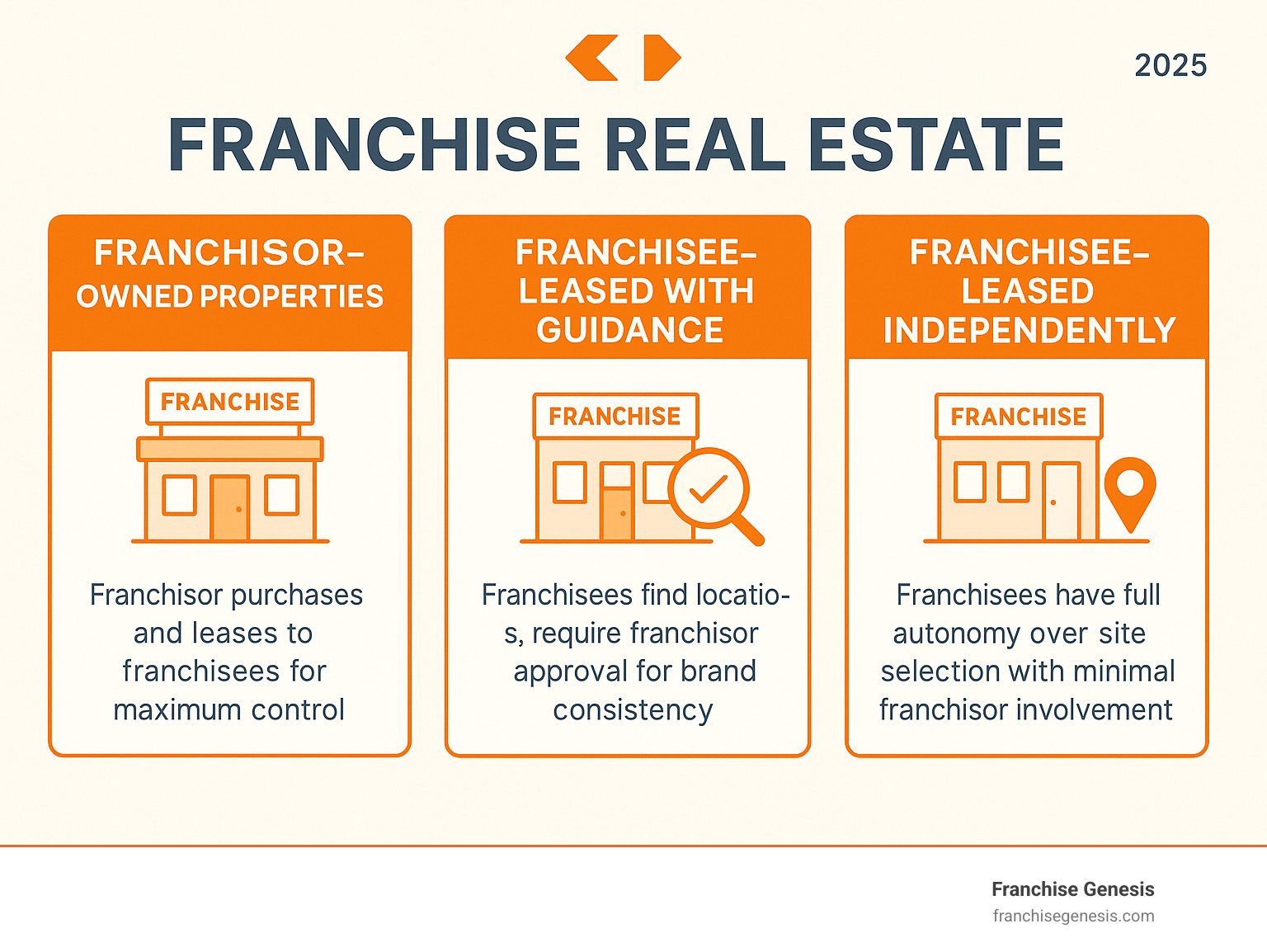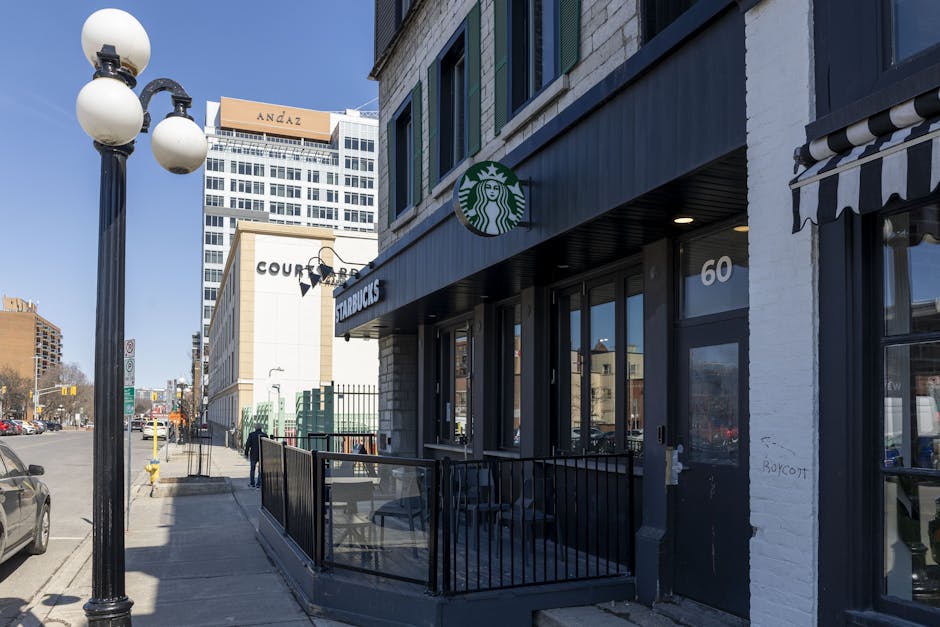Why Franchise Real Estate Decisions Shape Your Brand’s Future
Franchise real estate is the foundation that determines whether your expansion succeeds or struggles. When you’re ready to franchise your business, every location decision impacts brand consistency, franchisee profitability, and long-term growth potential.
Quick Answer: Franchise Real Estate Essentials
- Site Selection: Choose locations that match your brand’s target demographics and traffic patterns
- Real Estate Models: Decide between franchisor-owned, franchisee-leased with guidance, or full franchisee control
- Legal Framework: Document real estate requirements clearly in your Franchise Disclosure Document
- Support Systems: Provide franchisees with site evaluation tools, lease negotiation help, and approval processes
- Financial Impact: Balance franchisee investment requirements with brand standards and profitability
The real estate decisions you make as a franchisor will echo through every franchise location. Poor site selection can doom even the best business model, while strategic location planning creates a competitive advantage that attracts quality franchisees.
From market mapping to lease negotiations, franchise real estate requires careful planning and robust support systems. Your franchisees need clear guidelines, proven site selection criteria, and ongoing assistance to secure locations that drive revenue and protect your brand’s reputation.
I’m Monique Pelle Kunkle, Vice President of Operations at Franchise Genesis, where I’ve helped scale franchise models from healthcare concepts to mobile service businesses across multiple markets. My experience in franchise real estate strategy has shown me that the most successful franchise systems invest heavily in location planning and franchisee support from day one.

The Franchisor’s Role: Defining Your Real Estate Involvement
When you franchise your business, one of the first major decisions is your level of involvement in your franchisees’ franchise real estate choices. This decision shapes your control over brand consistency and the support your franchisees require. Successful franchisors find a balance between being too involved and too hands-off.
Your franchisees invest their future in your concept, counting on you for guidance that makes franchising worthwhile. Real estate support is a crucial part of this value, especially in a competitive market. The key is balancing control with flexibility. While brand consistency is vital, you must also respect your franchisees’ entrepreneurial spirit. Getting this balance right attracts quality partners; getting it wrong can deter them.
Learn more about franchise growth strategies to see how real estate decisions fit into your bigger expansion picture.

Hands-On vs. Hands-Off Approaches
When it comes to franchise real estate, you have several ways to stay involved. Each approach affects your investment, control level, and how much autonomy your franchisees have.
The franchisor-as-landlord model is the most hands-on approach. You buy or lease the property and rent it to your franchisees. This gives you maximum control over location quality and building appearance, and it creates an additional revenue stream. The downside is the significant upfront capital and ongoing property management responsibilities.
Master lease agreements offer a middle ground. You lease properties from third parties and sublease them to franchisees. This reduces your capital commitment while still giving you control over site selection and lease terms. Your franchisees get simplified lease negotiations, and you maintain quality standards without owning the real estate.
The hands-off approach puts site selection in your franchisees’ hands, but you still provide detailed site selection guidelines and require approval before they sign a lease. This might include specific requirements for visibility, accessibility, square footage, and zoning compliance. Your franchisees get more freedom, but you still protect your brand standards.
Providing guidelines while maintaining franchisee autonomy requires clear communication. Your franchise agreement should spell out your location expectations and approval process. Even in hands-off models, your franchisees expect guidance, as they are business owners relying on the support you provide.
Balancing Brand Standards with Local Market Realities
Real estate is inherently local. A standardized design that works in one market may not be feasible in a historic district or an expensive urban center. While standardized design elements are crucial for brand recognition, rigid inflexibility can kill deals. Smart franchisors build in adaptability, such as offering multiple approved color schemes or material options.
Local zoning laws also present challenges, with restrictions on signage, building materials, or operating hours. Your role is to help franchisees steer these rules while upholding your brand identity.
Market adaptability is key when expanding into diverse areas. A suburban strategy may not work in an urban or rural setting, so it’s important to listen to your franchisees’ local insights. Demographic considerations and the competitive landscape vary significantly between markets. Your site selection criteria must be specific enough to maintain standards but flexible enough for local conditions.
The goal is a consistent customer experience, not identical buildings. Every location must deliver the quality your customers expect, even if the physical space looks slightly different.
Crafting Your Franchise Real Estate Strategy
A winning franchise real estate strategy is the blueprint for your brand’s growth. Every location decision can either propel you forward or hold you back. A successful strategy relies on data-driven insights from market mapping, location intelligence, and customer flow analysis.

By analyzing demographics, traffic patterns, and local demand, you can identify where your ideal customers are and ensure high visibility for franchisees.
Your site selection criteria are the non-negotiables that protect your brand. Key factors include: Visibility from main roads, Accessibility with adequate parking, appropriate Square Footage for operations, Zoning compliance, and strategic Co-tenancy with businesses that attract your target customers. These criteria are the guardrails that guide each new location toward profitability.
Key Considerations for Your Franchise Real Estate Model
Choosing your real estate model impacts your upfront costs, control, and scaling speed.
Franchisee-owned property is often the most straightforward path for new franchisors. Your franchisees handle all real estate responsibilities—finding, leasing, or buying their locations. This keeps your capital requirements low and lets you focus on your brand systems. Your role shifts to providing clear site selection guidelines and approving locations that meet your standards.
Franchisor-leased property gives you more control over prime locations and can create an additional revenue stream. You lease properties and sublease them to your franchisees. This model requires more of your own capital but ensures every location aligns with your brand vision.
Third-party leasing with guidance offers a middle ground. Your franchisees find and lease their own spaces, but you provide support through preferred broker networks and pre-negotiated terms.
The financial implications vary significantly. Franchisees may need cash reserves from $50,000 to $150,000 or more, depending on the model. Your decision must balance your investment capacity with what you can reasonably expect from franchisees. Whatever model you choose, it must be clearly detailed in your Franchise Disclosure Document. For more insights on why franchising might be the right growth strategy for your business, check out Why You Should Franchise.
Developing Site Selection and Approval Processes
A solid site selection and approval process is your quality control system for franchise real estate. It prevents franchisees from making location decisions that could damage your brand’s reputation.
Start with data-driven territory analysis, using demographic platforms and mapping software to identify areas where your concept will thrive. Look at population density, income levels, lifestyle patterns, and competition to guide franchisees toward locations with the highest probability of success.
Your approval workflow should be thorough but efficient. When a franchisee submits a potential site, your team should conduct a market analysis, reviewing foot traffic, visibility, and the competitive landscape. A financial feasibility study ensures the location can support the franchisee’s investment and your royalty structure.
The site visit is where theory meets reality. This step confirms that the physical space can accommodate your operational requirements and brand standards.
Performance metrics help you refine your process over time. Track which types of locations perform best for your concept to gain invaluable data for guiding future franchisees.
At Franchise Genesis, our site selection and real estate support services help franchisors build systematic processes that protect your brand while empowering your franchisees to succeed. Your approval process should feel supportive, not restrictive, becoming a competitive advantage that attracts quality franchisees.
Building a Support System for Franchisees
Your franchisees’ success in franchise real estate directly impacts your brand. As they are entrepreneurs, not real estate experts, a robust support system is essential to prevent costly mistakes with location or lease agreements.
Your support should cover the entire real estate journey, including:
- Lease negotiation support: Help franchisees steer complex commercial leases with template riders, legal contacts, or standardized terms.
- Real estate broker networks: Connect franchisees with professionals who understand your brand’s site criteria and can find suitable properties.
- Construction guidance: Provide detailed build-out specifications, approved vendor lists, and project management oversight to ensure brand consistency.
- Grand opening support: Help new locations launch successfully to maximize their initial investment.

Training and Resources for Real Estate Success
Comprehensive training transforms franchisees into confident decision-makers. Provide detailed leasing guides that explain commercial real estate terminology, such as the difference between triple net and gross leases. Site evaluation tools like demographic templates and competitor assessment forms empower franchisees to analyze locations systematically. For foundational knowledge, resources like the SBA’s guide on choosing a business location can be invaluable.
Project management resources, including timelines and budget templates, are essential during the build-out phase. Strong vendor relationships leverage your brand’s purchasing power, saving franchisees money on construction, signage, and equipment. Finally, ongoing support through regular check-ins and performance reviews ensures real estate decisions continue to drive long-term success. For more comprehensive guidance on supporting your franchisees, check out our franchise operations manual resources.
Leveraging Technology in Site Selection
Technology has revolutionized how smart franchisors approach franchise real estate. Today’s site selection combines data science with local market knowledge to identify winning locations.
GIS mapping software transforms site selection from guesswork into science. You can overlay demographic data, traffic patterns, and competitor locations to spot patterns that aren’t obvious from spreadsheets.
Demographic data platforms provide detailed insights into local markets, helping you identify neighborhoods where your target customers live, work, and shop with precision.
AI-powered analytics can take this a step further by analyzing thousands of variables to predict sales volumes, identify optimal trade areas, and suggest ideal negotiation timing.
Virtual site tours save time and money during initial screening, allowing franchisees to evaluate multiple properties remotely before scheduling physical visits.
Competitive analysis tools help you understand the local business landscape, identify market gaps, and position new locations for maximum impact.
Combining these technological tools with human expertise gives your franchisees a significant advantage in securing prime locations.
Legal and Financial Frameworks
The legal and financial framework for franchise real estate protects all parties and enables sustainable growth by providing clarity for franchisee investments. The Franchise Disclosure Document (FDD) is the central component, detailing all real estate requirements and costs.
Item 7 of the FDD, “Estimated Initial Investment,” is critical, breaking down all franchisee costs, including real estate costs (deposits), leasehold improvements, equipment, inventory, and operating capital. The FDD must also disclose any real estate-related fees you charge, such as for site selection or construction management, and any rent if you are the landlord. Lease riders—addendums to lease agreements—are often used to specify brand requirements like signage or operating hours. Transparency in these documents is key to building trust and fostering successful long-term partnerships.
| Lease Scenario | Franchisor Responsibilities | Franchisee Responsibilities |
|---|---|---|
| Franchisor-Owned Property | Property purchase, maintenance, insurance, property taxes | Monthly rent, utilities, interior maintenance, compliance with lease terms |
| Franchisee-Leased with Guidance | Site approval, lease review, ongoing support | Property search, lease negotiation, all lease obligations, maintenance |
| Franchisee-Leased Independently | Initial guidelines, minimal oversight | Complete responsibility for site selection, leasing, and all related costs |
Legal Aspects of Franchise Real Estate in Your FDD
Your FDD is a tool for building trust through transparency in your franchise real estate system. Clear disclosures protect both parties and set expectations. Key areas to detail include:
- Real estate obligations: Clearly define who is responsible for buying, leasing, and securing property to prevent future conflicts.
- Site selection clauses: Outline your step-by-step approval process, including site criteria, required documentation, and timelines. This prevents franchisees from pursuing unsuitable locations.
- Lease terms and conditions: Explain typical lease durations (5-20 years), renewal options, and brand-specific clauses for maintenance, signage, or operations.
- Transferability rights: Detail how real estate is handled during a franchise transfer, including lease assumptions and approval processes for new owners.
Encourage prospective franchisees to seek independent legal advice to ensure they are fully informed partners. For deeper insights into staying compliant with all the regulatory requirements, check out our Franchisor’s Guide to FTC Rules.
Financial Models and Their Impact on Growth
The financial model for franchise real estate shapes your growth strategy, from expansion speed to the type of franchisee you attract.
Capital requirements for franchisees directly influence your candidate pool. Requirements can range from $50,000 in cash for some service franchises to over $150,000 for real estate brokerages. Setting this amount requires finding a sweet spot that ensures franchisees are well-capitalized without limiting your pool of candidates.
Royalty structures are typically 3% to 6% of gross sales, but your real estate model can create other revenue streams. If you own and lease properties to franchisees, you collect rent in addition to royalties, providing steady income but requiring significant upfront capital from you.
Impact on scalability is significant. If franchisees handle their own real estate, you can grow as quickly as you can find qualified candidates. If you purchase properties, your growth is limited by your capital. This is why multi-unit franchising is popular, as successful franchisees fund their own expansion.
Revenue streams from real estate can include site selection fees, construction management, or referral fees from preferred landlords, diversifying your income beyond royalties.
The goal is a balanced model that funds your support systems without pricing out good candidates, creating a system that can scale efficiently. For more strategies on driving growth through smart franchise development, explore our resources on franchise sales and marketing.
Conclusion
When you’re ready to turn your business into a franchise, franchise real estate becomes the cornerstone that determines whether your expansion dreams become reality or fall flat. Every location decision you make as a franchisor ripples through your entire system, affecting brand consistency, franchisee profitability, and your ability to scale successfully.
The strategic importance of getting your real estate approach right cannot be overstated. Whether you choose to be hands-on as a landlord, provide comprehensive site selection guidance, or find a middle ground with master lease agreements, this decision shapes how your franchisees experience your brand. It influences their initial investment, ongoing costs, and ultimately their success.
Your franchise real estate strategy becomes the foundation for franchisee success in ways that go far beyond just finding a building. When you provide robust support systems – from lease negotiation help to construction guidance, from demographic analysis tools to approval workflows – you’re giving your franchisees the best possible chance to thrive. This support is part of what makes franchising attractive to potential partners who could otherwise go it alone.
The legal and financial frameworks you establish today will determine your brand’s scalability tomorrow. By clearly outlining real estate obligations in your Franchise Disclosure Document and choosing financial models that balance franchisee investment with growth potential, you create a system that can expand efficiently while maintaining quality standards.
Technology has revolutionized how we approach site selection, and smart franchisors leverage GIS mapping, demographic data platforms, and AI-powered analytics to give their franchisees every advantage. These tools transform what used to be guesswork into data-driven decisions that protect both your brand’s reputation and your franchisees’ investments.
At Franchise Genesis, we’ve seen how the right real estate strategy creates long-term brand value. It’s not just about finding locations – it’s about building a systematic approach that supports scalable growth while empowering your franchisees to succeed in their local markets.
The decisions you make about franchise real estate today will echo through every location your brand opens. By investing in comprehensive planning, robust support systems, and clear legal frameworks now, you’re building the foundation for a franchise system that can grow confidently and sustainably.
Ready to build a solid foundation for your franchise? Get expert guidance on building your franchise system with Franchise Genesis.
